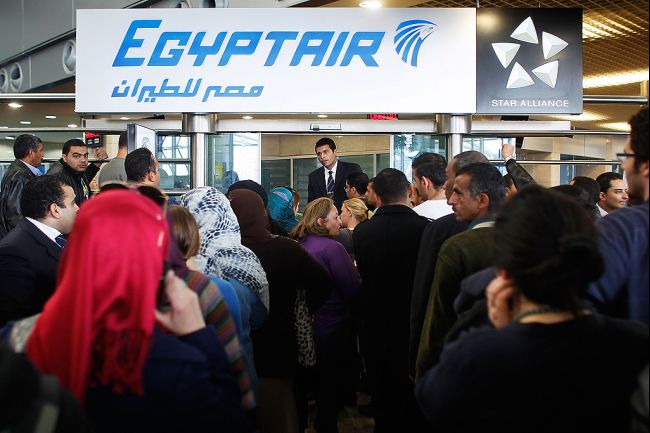The hijacked EgyptAir flight on Tuesday comes shortly after a series of security attacks that have substantially affected the tourism industry in Egypt, causing tourism revenues to sharply decline to $6bn in 2015.
This compares to the $12.5bn in revenues in 2010, prior to the 25 January Revolution.
An EgyptAir flight that departed from Borg El-Arab airport near Alexandria was hijacked Tuesday morning and forced to land in Larnaca airport in Cyprus.
Russian Tourist Union (RTU) spokesperson Irina Tyurina said Russia will not be resuming flights to Egypt, just days after Moscow had announced that the restoration of tourism flights would commence soon.
She said: “The resumption of flights between both countries is still not confirmed. Even if it was, today’s hijacking incident will further postpone it.”
RTU previously called on Egypt to secure the airspace and undertake additional security measures, including securing resorts and tourist facilities to ensure the safety of Russian tourists following the downing of the Russian airplane over Sinai in October.
Egyptian government officials are apprehensive about the consequences from this incident, which may further prolong the decline of the tourism industry.
Speaking to Daily News Egypt on condition of anonymity, a high-ranking official at the Ministry of Tourism said the incident will add to the already negative image of Egyptian airports abroad.
According to the official, the RTU will not resume its flights to Egypt before October, or unless the United Kingdom decided to resume its flights.
“European tourism represents about 72% of annual tourism revenue to Egypt. The decline in tourism will continue for the sixth year since the 25 January uprisings in 2011,” the official added.
Similarly, chairman of the Egyptian Tourism Federation Elhamy Al-Zayat told Daily News Egypt this year is only an extension of the decline in tourism over the past five years. “We hope the hijacking incident will not negatively affect the Egyptian image abroad now that Egypt is reassessing its security measures at airports,” he said.
Tourism is a main source of Egypt’s foreign currency reserves, which have recently plummeted, producing a crisis for the government in its attempts to maintain the exchange value of the Egyptian pound and simultaneously invite foreign direct investment.
Daily News Egypt also spoke to analysts and researchers who affirmed the incident will have negative consequences for Egyptian tourism.
Kinda Chebib, a lead analyst at independent market research firm Euromonitor International, considered the incident a blow to Egyptian tourism.
“The events of today are again a negative development for the tourism industry in Egypt and its economy, even if recent developments confirm that this is not a terrorist attack,” she told Daily News Egypt.
According to Chebib, this raises further concerns about security at airports in the country. “The [Russian plane] crash devastated Egypt’s tourism influx, from both Russia and the UK who have suspended their flights to the country until present,” she said.
With almost 3 million arrivals, Russia was the largest market for inbound tourism to Egypt in 2011. The UK is the second biggest market for Egypt with 1 million arrivals, she noted.
“Travellers are likely to remain very hesitant to travel to this part of the Middle East and will opt for destinations like the Gulf countries or elsewhere in North Africa. Although Egypt is known for quickly bouncing back from different crises, we believe that the recent events will slow down the ambitions of the local government to achieve the target of 20 million foreign tourist arrivals by 2020,” she added.
However, tourism tycoon and MP Amr Sedky viewed the incident more positively. He told Daily News Egypt: “We cannot predict the consequences of this event as long as we still are not completely sure of the real reason behind it.”
He criticised the purported backlash from the incident, as well as claims that a terror attack is behind the incident, saying these preceding claims lead to misleading facts and more complicated consequences. “Rather, there should be increased efforts to find out the real motive behind this incident,” Sedky said.
The hijacking comes shortly after the death of Italian PhD student Giulio Regeni. In early February, he was found in a ditch on the Cairo-Alexandria Desert Road. His body showed signs of torture. The incident caused tension in European and Egyptian relations, prompting the European Parliament to pass a non-binding resolution recommending the freezing of military aid to Egypt.
Following the Russian plane crash in October, the government had delegated a British firm, Control Risks, to undertake the required security measures at its airport. Meanwhile, when Russian authorities requested to send security personnel to its Egyptian airports for security, Egypt refused, considering this interference in its sovereignty.
According to figures from Euromonitor International, Russia was the fastest growing source market for Egypt in 2014, registering an 18% growth in fiscal year 2013/2014, whereas Italy represents the fourth biggest source market for Egypt. However, arrivals from Italy have declined by almost 50% from 2009 until 2014.


